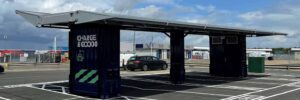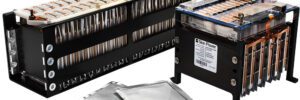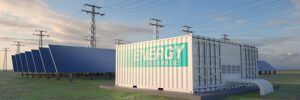The Lexus TZ might be the electric alternative to the recently unveiled TX.
Source: Electric Vehicle News
What I Learned On My First “Boots on the Ground” CleanTech Glamping Trip (Part 2)
In Part 1, I gave readers an update on my efforts to bring more “boots on the ground” coverage and review work to CleanTechnica. Getting even a basic and cheap cargo trailer built proved to be a bigger challenge than expected, but I manage to build it, get it loaded, and take some items out […]
Source: CleanTechnica Car Reviews RSS Feed
What I Learned On My First “Boots on the Ground” CleanTech Glamping Trip
If you’re a regular reader around here, you probably remember my fundraiser for getting more “boots on the ground” coverage and product reviews. I didn’t raise what I had hoped to raise, but still had a pretty successful Indiegogo campaign. In this article, I’m going to give readers an update on how this project is […]
Source: CleanTechnica Car Reviews RSS Feed
Look And Cixi Join Forces On New Digital Drive E-Bike Tech
The Pedaling Energy Recovery System (PERS) uses an algorithm that sends power to the back wheel.
Source: Electric Vehicle News
3ti installs solar-powered charging hubs at Britain’s Silverstone Circuit motor racetrack
UK solar car park developer 3ti has installed three of its Papilio3 pop-up solar car parks with integrated EV charging at Silverstone motor racetrack near London.
“The UK urgently needs more widespread EV charging infrastructure,” said Andrew Troop, Sales Director at 3ti, “and we would encourage more businesses to take Silverstone’s lead by installing charging on-site.”
Papilio3 combines local mains power with solar panels, a battery and up to 12 fast EV charge points. The combination of the three technologies, the company says, optimizes the speed and carbon intensity of EV charging and provides grid balancing.
Papilio3 is made with recycled shipping containers. According to 3ti it can be installed in under 24 hours with minimal groundwork and no new grid connection. It has approximately 20 kW of solar capacity, and can charge up to 12 EVs at 7, 11 or 22 kW. One of the three Silverstone units will be augmented with 1 MW of power from an existing solar roof array on the Wing International Conference and Exhibition Centre.
Source: 3ti
Source: Electric Vehicles Magazine
Sion Power’s Licerion lithium-metal battery technology now available for commercial evaluation
Sion Power has reported a major development milestone for its Licerion EV technology—the company has produced more than 18,000 multilayer, 6 Ah to 20 Ah lithium metal cells for commercial evaluation. Sion says Licerion EV delivers high energy density, enabling longer range with lighter and smaller batteries.
Licerion EV technology incorporates Sion Power’s protected lithium anode and uses an electrolyte composition optimized for fast charging applications. Sion says its patented applied uniform pressure method ensures extended cycle life for these cells.
In testing, Sion Power’s 6 Ah large-format Licerion EV cell has exceeded 800 cycles, and the 17 Ah cell has been independently verified at a specific energy of 400 Wh/kg and energy density of 780 Wh/L.
“We have more than just technology at Sion Power,” said CEO Tracy Kelley. “We have a product to sample. Our team continues to advance our technology and increase the availability of cells so that OEMs can test and incorporate it into their designs. To date, we have produced a vast number of multilayer lithium metal cells for commercial evaluations which continue to exceed our stated technical specifications.”
Sion says these cells are currently undergoing evaluation by several EV OEMs, and the company has increased the supply of commercially available 17 Ah cells for additional testing. Sion Power is currently taking preorders for the Licerion EV 56 Ah automotive B-sample cell, which is expected to be available in late 2024.
Source: Sion Power
Source: Electric Vehicles Magazine
Amazon brings Rivian electric delivery vans to Germany
In 2019, Amazon announced an order of 100,000 electric delivery vehicles from then-startup Rivian, and the two companies collaborated to design a new state-of-the-art EV. Amazon began rolling out the new electric vans in the summer of 2022. The company says it now has 3,000 Rivian vans in service across the US, along with 2,000 electric delivery vans from other manufacturers. (The retail whale has also ordered delivery vans from Mercedes-Benz and Stellantis, and Class 6 and 8 electric trucks from Lion Electric.)
Now Amazon has announced the arrival of its first wave of Rivian vans in Europe. More than 300 Rivians will hit the strassen in the German cities of Munich, Berlin and Dusseldorf in the coming weeks. Amazon also has “thousands” of electric vans in operation in Europe, including more than 1,000 in Germany. Amazon announced last year that it plans to invest more than €1 billion to electrify its European transportation network and reduce carbon emissions over the coming years.

“Together, Amazon and Rivian designed and built a state-of-the-art electric vehicle from the ground up, and unlike anything else on the road today,” said Neil Emery, Amazon’s Director, Global Fleet & Product. “The safety and comfort of our drivers were top of mind for us throughout this process, and we’ve raised the bar on both with the vehicle we are rolling out in Europe today.”
Worldwide, Amazon has deployed some 15 different EV models, including delivery vehicles, e-cargo bikes and e-rickshaws, in the US, the EU and India.
News of the delivery, Rivian’s first commercial shipment outside the US, along with this week’s second-quarter delivery numbers, has sent RIVN stock through the roof over the past few days. Earlier this week, Rivian reported Q2 production of 13,992 vehicles, exceeding estimates, and reaffirmed plans to more than double output to 50,000 vehicles this year.
“The EDV [electric delivery van] was designed in conjunction with our partners at Amazon and not only puts driver convenience and safety first but also the environment,” said Rivian VP of Strategy Dagan Mishoulam. “We’ve had incredible feedback from drivers in the US, and we’re excited to start international expansion in Germany.”
Sources: Amazon, Bloomberg, Reuters
Source: Electric Vehicles Magazine
California Energy Commission reports growth in clean electricity portfolio and battery storage capacity
Data from the California Energy Commission (CEC) indicates a 2.7% increase from 2020 to 2021 in the share of the state’s electricity generated by Renewables Portfolio Standard (RPS)-eligible sources like solar and wind, bringing the total to 37%.
When combined with that derived from other carbon-free sources, including hydroelectric, nuclear, biomass and geothermal, the percentage of the state’s retail electric sales of clean electricity rises to 59%, unchanged from 2020 due to drought-related hydroelectric declines.
The RPS program was established in 2002 with an initial requirement that 20% of electricity retail sales be served by renewable resources by 2017. The goal was raised to 33% by 2020 and was met in 2018. The latest goal is to reach 60% by 2030. Ultimately, the policy requires 100% compliance by 2045 for the state’s electricity retail sales and electricity to serve state agencies; interim targets are 90% by 2030 and 95% by 2040.
According to the California Independent System Operator, the state’s battery storage capacity has increased from 250 MW to 5,000 MW since 2019, enough to power up to 5 million homes. Capacity is projected to increase to 52,000 MW by mid-century.
Source: CEC
Source: Electric Vehicles Magazine
UL Solutions starts construction of Advanced Battery Laboratory in Michigan
US global safety science company UL Solutions has started construction of its North America Advanced Battery Laboratory in Auburn Hills, Michigan. Completion is expected by mid-2024.
The laboratory’s purpose is to facilitate shorter development cycles, faster times-to-market, and greater global competitiveness for EV and industrial battery OEMs and their suppliers. It will provide electrical, mechanical abuse, thermal fire propagation and environmental testing based on UL and IEC standards, UN goals and initiatives, and Society of Automotive Engineers and OEM specifications.
“We are pleased to welcome UL Solutions to Auburn Hills, where its new laboratory will help North American manufacturers bring safer products to market in the US and for export throughout North America,” said Auburn Hills Mayor Kevin McDaniel.
Source: UL Solutions
Source: Electric Vehicles Magazine
Tesla Cybertruck's 4680 Cells Boast 10% Higher Energy Density
Tesla also revealed that 4680 cell production at the Texas plant increased 80 percent in the second quarter over the first.
Source: Electric Vehicle News






